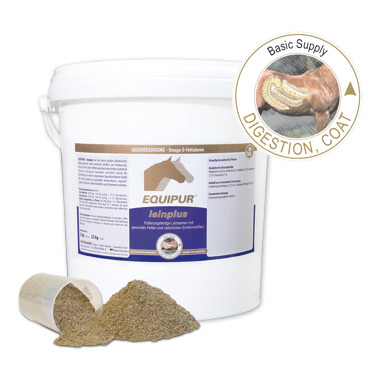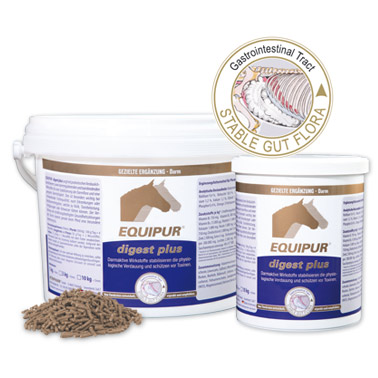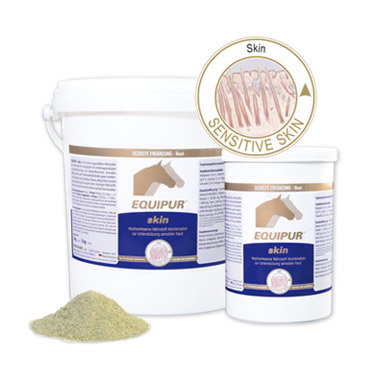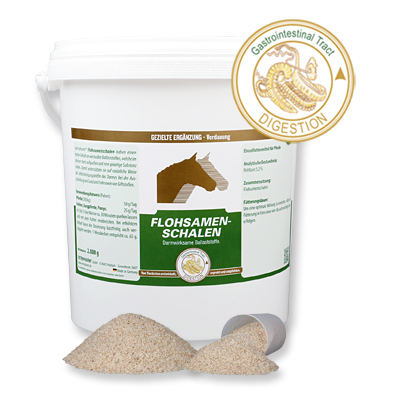
EQUIPUR - leinplus
Feed material for horses
Linseed meal from controlled flax cultivation.
| 5 kg | Bucket | Powder |
| 25 kg | Bag | Powder |
Product Details
Application
Analytical constituents
Composition
Instructions for proper use
Feeding period
General findings of nutritional science
Application
EQUIPUR - leinplus has with its wide dietary effectiveness a positive effect on digestion, skin and coat. This effect is specially strengthened by its high content of omega-3 fatty acids. By ultra-careful production, using a special, gentle process, the content of essential amino acids, unsaturated fatty acids, mineral substances, and vitamins remains intact.
Analytical constituents
| Crude protein | 20,8 % | |
| Crude fat | 40,0 % | |
| Crude fibre | 7,1 % | |
| Crude ash | 3,3 % | |
| Sodium | 0,1% | |
| Essential fatty acid Content | ||
| Omega-3 fatty acids | 22,4 % | |
| Omega-6 fatty acids | 6,0 % | |
Composition
Linseed (ground) 100.0 %.
Instructions for proper use
Breeding horses (500 kg): 150 - 200 g per day
Sport horses (500 kg): 100 - 150 g per day
Foals, young horses and ponies: 50 - 100 g per day
given with the feed.
Do not heat over 50° C because valuable ingredients may be destroyed. Soaking or boiling is not necessary!
Feeding period
For maximum effectiveness, the product should be applied over an extended period at least for 4 weeks. Feeding the whole year round does not pose any problems and will be beneficial.
Responsible for the labelling: Vetripharm GmbH, Gewerbestraße Süd 7, D-86857 Hurlach
Corresponding declaration concerning minimum storage life and lot reference number can be found on packaging.
According to the anti-doping and medication control rules of the “Deutsche Reiterliche Vereinigung (FN)“, application of this product during competition is allowed (ADMR conform).
General findings of nutritional science
Linseed has a high percentage of unsaturated fatty acids, essential amino acids, mucins and vitamin E.
Unsaturated, essential fatty acids are not only the starting substance for a large number of vital tissue hormones, they are also an indispensable component in the formation of cell membranes. As the intestinal mucosa has to renew itself very quickly (in the small intestine, the entire mucosa is replaced approximately every 3 days!), an undersupply of essential fatty acids leads to significantly slower regeneration and corresponding damage to the mucosa. This results in impaired feed conversion and nutrient absorption as well as an increased susceptibility to intestinal diseases such as colic or diarrhea. The same applies, of course, to other rapidly dividing tissues such as the skin and hair. Here, the essential fatty acids reduce susceptibility to inflammation and allergic reactions, increase the suppleness and resistance of the skin and hair and accelerate the healing of pathological changes.
The high-quality protein in linseed contains essential amino acids such as lysine, methionine and cystine. While lysine is used to build up the body's own substances, methionine and cystine have a significant influence on the condition of the skin and coat.
On the one hand, the mucilage in linseed coats the mucous membrane of the gastrointestinal tract with a thin protective and lubricating layer. On the other hand, flaxseed mucilage can bind large amounts of liquid due to its good swelling properties; this results in its positive effect on diarrhea.

Service phone
Freecall: 0800 / VETRIPHARM
Telefon: 0 82 48 / 888 88 - 0





